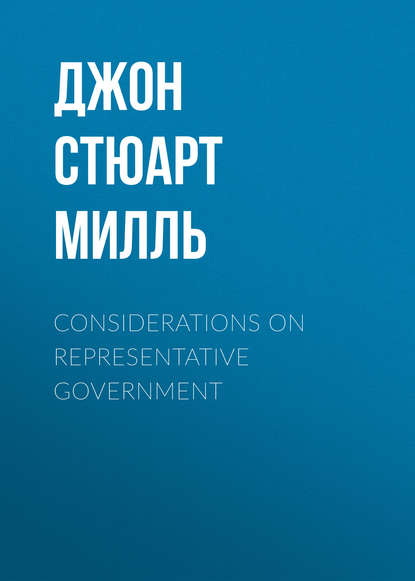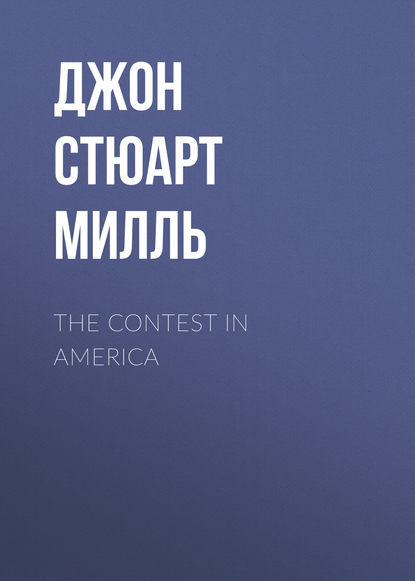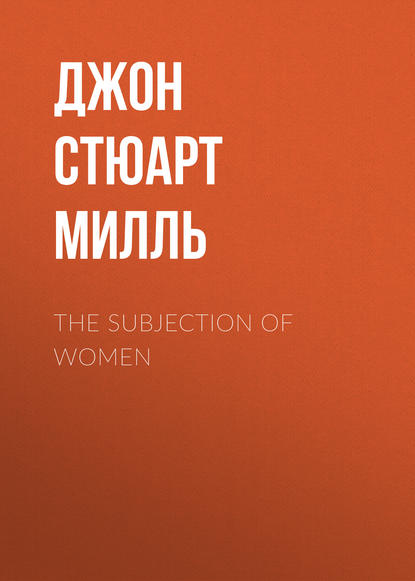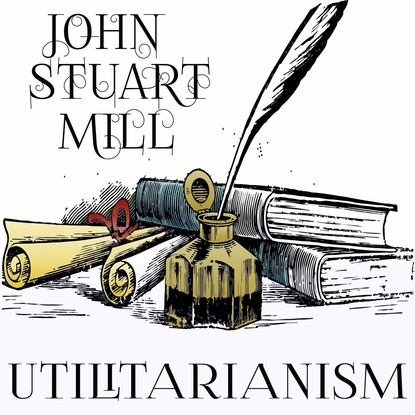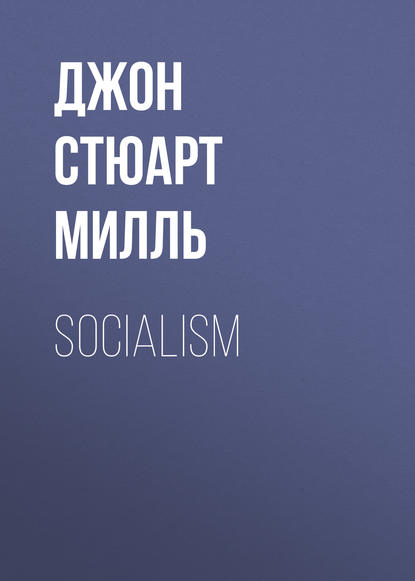 Полная версия
Полная версияПолная версия:
Джон Стюарт Милль Socialism
- + Увеличить шрифт
- - Уменьшить шрифт

John Stuart Mill
Socialism
PRELIMINARY NOTICE
It was in the year 1869 that, impressed with the degree in which, even during the last twenty years, when the world seemed so wholly occupied with other matters, the socialist ideas of speculative thinkers had spread among the workers in every civilized country, Mr. Mill formed the design of writing a book on Socialism. Convinced that the inevitable tendencies of modern society must be to bring the questions involved in it always more and more to the front, he thought it of great practical consequence that they should be thoroughly and impartially considered, and the lines pointed out by which the best speculatively-tested theories might, without prolongation of suffering on the one hand, or unnecessary disturbance on the other, be applied to the existing order of things. He therefore planned a work which should go exhaustively through the whole subject, point by point; and the chapters now printed are the first rough drafts thrown down towards the foundation of that work. These chapters might not, when the work came to be completely written out and then re-written, according to the author's habit, have appeared in the present order; they might have been incorporated into different parts of the work. It has not been without hesitation that I have yielded to the urgent wish of the editor of this Review to give these chapters to the world; but I have complied with his request because, while they appear to me to possess great intrinsic value as well as special application to the problems now forcing themselves on public attention, they will not, I believe, detract even from the mere literary reputation of their author, but will rather form an example of the patient labor with which good work is done.
Helen Taylor.January, 1879.
INTRODUCTORY
In the great country beyond the Atlantic, which is now well-nigh the most powerful country in the world, and will soon be indisputably so, manhood suffrage prevails. Such is also the political qualification of France since 1848, and has become that of the German Confederation, though not of all the several states composing it. In Great Britain the suffrage is not yet so widely extended, but the last Reform Act admitted within what is called the pale of the Constitution so large a body of those who live on weekly wages, that as soon and as often as these shall choose to act together as a class, and exert for any common object the whole of the electoral power which our present institutions give them, they will exercise, though not a complete ascendency, a very great influence on legislation. Now these are the very class which, in the vocabulary of the higher ranks, are said to have no stake in the country. Of course they have in reality the greatest stake, since their daily bread depends on its prosperity. But they are not engaged (we may call it bribed) by any peculiar interest of their own, to the support of property as it is, least of all to the support of inequalities of property. So far as their power reaches, or may hereafter reach, the laws of property have to depend for support upon considerations of a public nature, upon the estimate made of their conduciveness to the general welfare, and not upon motives of a mere personal character operating on the minds of those who have control over the Government.
It seems to me that the greatness of this change is as yet by no means completely realized, either by those who opposed, or by those who effected our last constitutional reform. To say the truth, the perceptions of Englishmen are of late somewhat blunted as to the tendencies of political changes. They have seen so many changes made, from which, while only in prospect, vast expectations were entertained, both of evil and of good, while the results of either kind that actually followed seemed far short of what had been predicted, that they have come to feel as if it were the nature of political changes not to fulfil expectation, and have fallen into a habit of half-unconscious belief that such changes, when they take place without a violent revolution, do not much or permanently disturb in practice the course of things habitual to the country. This, however, is but a superficial view either of the past or of the future. The various reforms of the last two generations have been at least as fruitful in important consequences as was foretold. The predictions were often erroneous as to the suddenness of the effects, and sometimes even as to the kind of effect. We laugh at the vain expectations of those who thought that Catholic emancipation would tranquilize Ireland, or reconcile it to British rule. At the end of the first ten years of the Reform Act of 1832, few continued to think either that it would remove every important practical grievance, or that it had opened the door to universal suffrage. But five-and-twenty years more of its operation had given scope for a large development of its indirect working, which is much more momentous than the direct. Sudden effects in history are generally superficial. Causes which go deep down into the roots of future events produce the most serious parts of their effect only slowly, and have, therefore, time to become a part of the familiar order of things before general attention is called to the changes they are producing; since, when the changes do become evident, they are often not seen, by cursory observers, to be in any peculiar manner connected with the cause. The remoter consequences of a new political fact are seldom understood when they occur, except when they have been appreciated beforehand.
This timely appreciation is particularly easy in respect to tendencies of the change made in our institutions by the Reform Act of 1867. The great increase of electoral power which the Act places within the reach of the working classes is permanent. The circumstances which have caused them, thus far, to make a very limited use of that power, are essentially temporary. It is known even to the most inobservant, that the working classes have, and are likely to have, political objects which concern them as working classes, and on which they believe, rightly or wrongly, that the interests and opinions of the other powerful classes are opposed to theirs. However much their pursuit of these objects may be for the present retarded by want of electoral organization, by dissensions among themselves, or by their not having reduced as yet their wishes into a sufficiently definite practical shape, it is as certain as anything in politics can be, that they will before long find the means of making their collective electoral power effectively instrumental to the proportion of their collective objects. And when they do so, it will not be in the disorderly and ineffective way which belongs to a people not habituated to the use of legal and constitutional machinery, nor will it be by the impulse of a mere instinct of levelling. The instruments will be the press, public meetings and associations, and the return to Parliament of the greatest possible number of persons pledged to the political aims of the working classes. The political aims will themselves be determined by definite political doctrines; for politics are now scientifically studied from the point of view of the working classes, and opinions conceived in the special interest of those classes are organized into systems and creeds which lay claim to a place on the platform of political philosophy, by the same right as the systems elaborated by previous thinkers. It is of the utmost importance that all reflecting persons should take into early consideration what these popular political creeds are likely to be, and that every single article of them should be brought under the fullest light of investigation and discussion, so that, if possible, when the time shall be ripe, whatever is right in them may be adopted, and what is wrong rejected by general consent, and that instead of a hostile conflict, physical or only moral, between the old and the new, the best parts of both may be combined in a renovated social fabric. At the ordinary pace of those great social changes which are not effected by physical violence, we have before us an interval of about a generation, on the due employment of which it depends whether the accommodation of social institutions to the altered state of human society, shall be the work of wise foresight, or of a conflict of opposite prejudices. The future of mankind will be gravely imperilled, if great questions are left to be fought over between ignorant change and ignorant opposition to change.
And the discussion that is now required is one that must go down to the very first principles of existing society. The fundamental doctrines which were assumed as incontestable by former generations, are now put again on their trial. Until the present age, the institution of property in the shape in which it has been handed down from the past, had not, except by a few speculative writers, been brought seriously into question, because the conflicts of the past have always been conflicts between classes, both of which had a stake in the existing constitution of property. It will not be possible to go on longer in this manner. When the discussion includes classes who have next to no property of their own, and are only interested in the institution so far as it is a public benefit, they will not allow anything to be taken for granted – certainly not the principle of private property, the legitimacy and utility of which are denied by many of the reasoners who look out from the stand-point of the working classes. Those classes will certainly demand that the subject, in all its parts, shall be reconsidered from the foundation; that all proposals for doing without the institution, and all modes of modifying it which have the appearance of being favorable to the interest of the working classes, shall receive the fullest consideration and discussion before it is decided that the subject must remain as it is. As far as this country is concerned, the dispositions of the working classes have as yet manifested themselves hostile only to certain outlying portions of the proprietary system. Many of them desire to withdraw questions of wages from the freedom of contract, which is one of the ordinary attributions of private property. The more aspiring of them deny that land is a proper subject for private appropriation, and have commenced an agitation for its resumption by the State. With this is combined, in the speeches of some of the agitators, a denunciation of what they term usury, but without any definition of what they mean by the name; and the cry does not seem to be of home origin, but to have been caught up from the intercourse which has recently commenced through the Labor Congresses and the International Society, with the continental Socialists who object to all interest on money, and deny the legitimacy of deriving an income in any form from property apart from labor. This doctrine does not as yet show signs of being widely prevalent in Great Britain, but the soil is well prepared to receive the seeds of this description which are widely scattered from those foreign countries where large, general theories, and schemes of vast promise, instead of inspiring distrust, are essential to the popularity of a cause. It is in France, Germany, and Switzerland that anti-property doctrines in the widest sense have drawn large bodies of working men to rally round them. In these countries nearly all those who aim at reforming society in the interest of the working classes profess themselves Socialists, a designation under which schemes of very diverse character are comprehended and confounded, but which implies at least a remodelling generally approaching to abolition of the institution of private property. And it would probably be found that even in England the more prominent and active leaders of the working classes are usually in their private creed Socialists of one order or another, though being, like most English politicians, better aware than their Continental brethren that great and permanent changes in the fundamental ideas of mankind are not to be accomplished by a coup de main, they direct their practical efforts towards ends which seem within easier reach, and are content to hold back all extreme theories until there has been experience of the operation of the same principles on a partial scale. While such continues to be the character of the English working classes, as it is of Englishmen in general, they are not likely to rush head-long into the reckless extremities of some of the foreign Socialists, who, even in sober Switzerland, proclaim themselves content to begin by simple subversion, leaving the subsequent reconstruction to take care of itself; and by subversion, they mean not only the annihilation of all government, but getting all property of all kinds out of the hands of the possessors to be used for the general benefit; but in what mode it will, they say, be time enough afterwards to decide.
The avowal of this doctrine by a public newspaper, the organ of an association (La Solidarite published at Neuchatel), is one of the most curious signs of the times. The leaders of the English working-men – whose delegates at the congresses of Geneva and Bale contributed much the greatest part of such practical common sense as was shown there – are not likely to begin deliberately by anarchy, without having formed any opinion as to what form of society should be established in the room of the old. But it is evident that whatever they do propose can only be properly judged, and the grounds of the judgment made convincing to the general mind, on the basis of a previous survey of the two rival theories, that of private property and that of Socialism, one or other of which must necessarily furnish most of the premises in the discussion. Before, therefore, we can usefully discuss this class of questions in detail, it will be advisable to examine from their foundations the general question raised by Socialism. And this examination should be made without any hostile prejudice. However irrefutable the arguments in favor of the laws of property may appear to those to whom they have the double prestige of immemorial custom and of personal interest, nothing is more natural than that a working man who has begun to speculate on politics, should regard them in a very different light. Having, after long struggles, attained in some countries, and nearly attained in others, the point at which for them, at least, there is no further progress to make in the department of purely political rights, is it possible that the less fortunate classes among the "adult males" should not ask themselves whether progress ought to stop there? Notwithstanding all that has been done, and all that seems likely to be done, in the extension of franchises, a few are born to great riches, and the many to a penury, made only more grating by contrast. No longer enslaved or made dependent by force of law, the great majority are so by force of poverty; they are still chained to a place, to an occupation, and to conformity with the will of an employer, and debarred by the accident of birth both from the enjoyments, and from the mental and moral advantages, which others inherit without exertion and independently of desert. That this is an evil equal to almost any of those against which mankind have hitherto struggled, the poor are not wrong in believing. Is it a necessary evil? They are told so by those who do not feel it – by those who have gained the prizes in the lottery of life. But it was also said that slavery, that despotism, that all the privileges of oligarchy were necessary. All the successive steps that have been made by the poorer classes, partly won from the better feelings of the powerful, partly extorted from their fears, and partly bought with money, or attained in exchange for support given to one section of the powerful in its quarrels with another, had the strongest prejudices opposed to them beforehand; but their acquisition was a sign of power gained by the subordinate classes, a means to those classes of acquiring more; it consequently drew to those classes a certain share of the respect accorded to power, and produced a corresponding modification in the creed of society respecting them; whatever advantages they succeeded in acquiring came to be considered their due, while, of those which they had not yet attained, they continued to be deemed unworthy. The classes, therefore, which the system of society makes subordinate, have little reason to put faith in any of the maxims which the same system of society may have established as principles. Considering that the opinions of mankind have been found so wonderfully flexible, have always tended to consecrate existing facts, and to declare what did not yet exist, either pernicious or impracticable, what assurance have those classes that the distinction of rich and poor is grounded on a more imperative necessity than those other ancient and long-established facts, which, having been abolished, are now condemned even by those who formerly profited by them? This cannot be taken on the word of an interested party. The working classes are entitled to claim that the whole field of social institutions should be re-examined, and every question considered as if it now arose for the first time; with the idea constantly in view that the persons who are to be convinced are not those who owe their ease and importance to the present system, but persons who have no other interest in the matter than abstract justice and the general good of the community. It should be the object to ascertain what institutions of property would be established by an unprejudiced legislator, absolutely impartial between the possessors of property and the non-possessors; and to defend and to justify them by the reasons which would really influence such a legislator, and not by such as have the appearance of being got up to make out a case for what already exists. Such rights or privileges of property as will not stand this test will, sooner or later, have to be given up. An impartial hearing ought, moreover, to be given to all objections against property itself. All evils and inconveniences attaching to the institution in its best form ought to be frankly admitted, and the best remedies or palliatives applied which human intelligence is able to devise. And all plans proposed by social reformers, under whatever name designated, for the purpose of attaining the benefits aimed at by the institution of property without its inconveniences, should be examined with the same candor, not prejudged as absurd or impracticable.
Socialist Objections to the Present Order of SocietyAs in all proposals for change there are two elements to be considered – that which is to be changed, and that which it is to be changed to – so in Socialism considered generally, and in each of its varieties taken separately, there are two parts to be distinguished, the one negative and critical, the other constructive. There is, first, the judgment of Socialism on existing institutions and practices and on their results; and secondly, the various plans which it has propounded for doing better. In the former all the different schools of Socialism are at one. They agree almost to identity in the faults which they find with the economical order of existing society. Up to a certain point also they entertain the same general conception of the remedy to be provided for those faults; but in the details, notwithstanding this general agreement, there is a wide disparity. It will be both natural and convenient, in attempting an estimate of their doctrines, to begin with the negative portion which is common to them all, and to postpone all mention of their differences until we arrive at that second part of their undertaking, in which alone they seriously differ.
This first part of our task is by no means difficult; since it consists only in an enumeration of existing evils. Of these there is no scarcity, and most of them are by no means obscure or mysterious. Many of them are the veriest commonplaces of moralists, though the roots even of these lie deeper than moralists usually attempt to penetrate. So various are they that the only difficulty is to make any approach to an exhaustive catalogue. We shall content ourselves for the present with mentioning a few of the principal. And let one thing be remembered by the reader. When item after item of the enumeration passes before him, and he finds one fact after another which he has been accustomed to include among the necessities of nature urged as an accusation against social institutions, he is not entitled to cry unfairness, and to protest that the evils complained of are inherent in Man and Society, and are such as no arrangements can remedy. To assert this would be to beg the very question at issue. No one is more ready than Socialists to admit – they affirm it indeed much more decidedly than truth warrants – that the evils they complain of are irremediable in the present constitution of society. They propose to consider whether some other form of society may be devised which would not be liable to those evils, or would be liable to them in a much less degree. Those who object to the present order of society, considered as a whole and who accept as an alternative the possibility of a total change, have a right to set down all the evils which at present exist in society as part of their case, whether these are apparently attributable to social arrangements or not, provided they do not flow from physical laws which human power is not adequate, or human knowledge has not yet learned, to counteract. Moral evils and such physical evils as would be remedied if all persons did as they ought, are fairly chargeable against the state of society which admits of them; and are valid as arguments until it is shown that any other state of society would involve an equal or greater amount of such evils. In the opinion of Socialists, the present arrangements of society in respect to Property and the Production and Distribution of Wealth, are as means to the general good, a total failure. They say that there is an enormous mass of evil which these arrangements do not succeed in preventing; that the good, either moral or physical, which they realize is wretchedly small compared with the amount of exertion employed, and that even this small amount of good is brought about by means which are full of pernicious consequences, moral and physical.
First among existing social evils may be mentioned the evil of Poverty. The institution of Property is upheld and commended principally as being the means by which labor and frugality are insured their reward, and mankind enabled to emerge from indigence. It may be so; most Socialists allow that it has been so in earlier periods of history. But if the institution can do nothing more or better in this respect than it has hitherto done, its capabilities, they affirm, are very insignificant. What proportion of the population, in the most civilized countries of Europe, enjoy in their own persons anything worth naming of the benefits of property? It may be said, that but for property in the hands of their employers they would be without daily bread; but, though this be conceded, at least their daily bread is all that they have; and that often in insufficient quantity; almost always of inferior quality; and with no assurance of continuing to have it at all; an immense proportion of the industrious classes being at some period or other of their lives (and all being liable to become) dependent, at least temporarily, on legal or voluntary charity. Any attempt to depict the miseries of indigence, or to estimate the proportion of mankind who in the most advanced countries are habitually given up during their whole existence to its physical and moral sufferings, would be superfluous here. This may be left to philanthropists, who have painted these miseries in colors sufficiently strong. Suffice it to say that the condition of numbers in civilized Europe, and even in England and France, is more wretched than that of most tribes of savages who are known to us.
It may be said that of this hard lot no one has any reason to complain, because it befalls those only who are outstripped by others, from inferiority of energy or of prudence. This, even were it true, would be a very small alleviation of the evil. If some Nero or Domitian was to require a hundred persons to run a race for their lives, on condition that the fifty or twenty who came in hindmost should be put to death, it would not be any diminution of the injustice that the strongest or nimblest would, except through some untoward accident, be certain to escape. The misery and the crime would be that they were put to death at all. So in the economy of society; if there be any who suffer physical privation or moral degradation, whose bodily necessities are either not satisfied or satisfied in a manner which only brutish creatures can be content with, this, though not necessarily the crime of society, is pro tanto a failure of the social arrangements. And to assert as a mitigation of the evil that those who thus suffer are the weaker members of the community, morally or physically, is to add insult to misfortune. Is weakness a justification of suffering? Is it not, on the contrary, an irresistible claim upon every human being for protection against suffering? If the minds and feelings of the prosperous were in a right state, would they accept their prosperity if for the sake of it even one person near them was, for any other cause than voluntary fault, excluded from obtaining a desirable existence?

